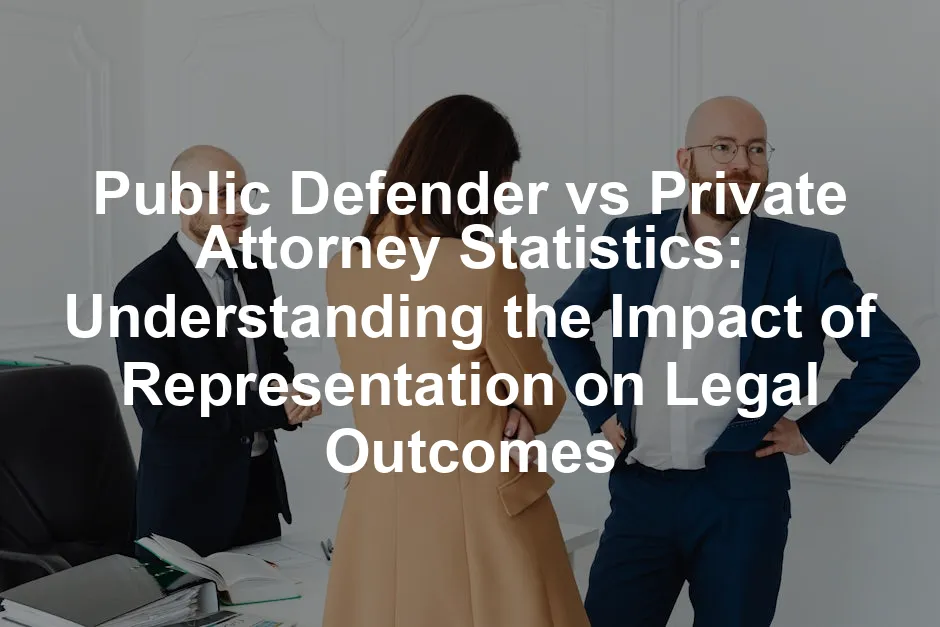Introduction
When facing criminal charges, choosing the right attorney can feel like picking the best flavor at an ice cream shop—overwhelming but crucial! Public defenders and private attorneys serve distinct roles in the legal system, each with unique strengths and weaknesses. Understanding these differences is essential for defendants, as it can significantly impact case outcomes.
Public defenders are appointed to represent individuals who cannot afford private legal counsel. They play a vital role in ensuring that justice is accessible to all, regardless of financial means. However, they often face heavy caseloads and resource limitations. On the other hand, private attorneys operate independently, charging fees that vary widely based on their expertise and the complexity of the case. This often allows them to devote more time and resources to individual clients.
Research reveals a significant disparity in representation outcomes. Statistics indicate that defendants represented by public defenders may have higher conviction rates and longer sentences compared to their privately retained counterparts. For example, a study from Ohio found that individuals with public defenders were more likely to face jail time and received, on average, longer sentences than those who hired private attorneys.
This blog post will dive into key statistics and studies that highlight the differences in legal outcomes between public defenders and private attorneys. By shedding light on this topic, we aim to help individuals facing criminal charges make informed decisions about their legal representation. In a system where every second counts, having the right attorney can make all the difference in the world! Understanding the impact of representation is crucial.

Understanding the impact of representation is crucial. Understanding the impact of representation
Understanding Representation Options
Defining Public Defenders and Private Attorneys
Public defenders are government-appointed attorneys who provide legal representation to low-income defendants. They handle a wide range of cases, from misdemeanors to serious felonies. Their funding comes from state or local governments, which can limit available resources. Public defenders often juggle numerous cases simultaneously, impacting the time and attention they can dedicate to each client.
Private attorneys, in contrast, are hired directly by clients. They can choose which cases to take on, allowing them to focus more intently on fewer cases. These attorneys typically charge fees that reflect their expertise and time commitment. This financial model enables private attorneys to invest more resources into each case, often leading to more personalized representation.

To keep your legal documents organized, consider investing in a Portable Document Scanner for Legal Documents. This handy gadget allows you to digitize your important papers on the go, ensuring you can access your files anytime without the risk of losing them. It’s like having a mini office in your pocket!
Eligibility for Public Defenders
Not everyone qualifies for a public defender. Generally, defendants must meet specific income criteria, which vary by jurisdiction. Eligibility often hinges on financial need, but other factors, such as the nature of the charges and potential incarceration, may also be considered.
For those who qualify, a public defender can provide critical legal support. Yet, the high demand for these services means that even eligible individuals may experience constraints in the scope of representation. This reality underscores the importance of understanding the differences in representation options when navigating the complexities of the legal system.
Now that we have a clearer picture of the roles of public defenders and private attorneys, let’s get ready to crunch some numbers! The next sections will present statistical insights that further illustrate the impact of legal representation on case outcomes.

Pros and Cons of Public Defenders vs. Private Attorneys
Public Defenders
Pros
1. Cost-effectiveness: The most significant advantage of public defenders is that they offer free legal representation. For those strapped for cash, this is a welcome relief. Who wouldn’t want to save a buck or two, especially when the stakes are high?
2. Familiarity with Local Courts: Public defenders are seasoned pros in their local court systems. They know the judges and prosecutors like the back of their hand. This can be a game-changer when negotiating plea deals. It’s like having a friend in the right places—except this friend is a legal expert!

Cons
1. Heavy Caseloads: Here’s where the plot thickens. Public defenders often handle a staggering number of cases—sometimes upwards of 100 each year! This overload means they have limited time to dedicate to each case, often leading to rushed work and less personal attention. Imagine juggling bowling pins while riding a unicycle; it’s tough!
2. Limited Resources: Public defenders frequently lack access to the extensive resources available to private firms. They might not have the luxury of expert witnesses or private investigators at their disposal. This disparity can impact the thoroughness of your defense, making it a bit like trying to win a race on a three-legged race team where one leg is tied!
Private Attorneys
Pros
1. Personalized Attention: One of the biggest perks of hiring a private attorney is the tailored approach. With a lower caseload, they can dedicate time to crafting strategies that fit your unique situation. Think of it as getting a custom-tailored suit instead of picking one off the rack. It just fits better!
2. Access to Resources: Private attorneys typically have more resources at their disposal. This includes hiring expert witnesses, conducting thorough investigations, and utilizing advanced legal technologies. When you’re building your defense, having the right tools can make all the difference, much like having a Swiss Army knife at a picnic. And speaking of tools, consider a Highlighters Set for Important Legal Notes to keep your notes organized and your thoughts on point!

Cons
1. Cost: The flip side of personalized attention is the price tag. Hiring a private attorney can put a significant dent in your wallet. Depending on the complexity of the case, fees can range from a few thousand to tens of thousands of dollars. If only courtrooms accepted payment in installments of pizza!
2. Variability in Quality: Not every private attorney is created equal. While some may boast impressive credentials and a track record of success, others may not deliver the same level of service. It’s essential to do your homework and choose wisely—like picking a restaurant based on reviews instead of just the menu!
In conclusion, weighing the pros and cons of public defenders and private attorneys is crucial. Each option has its strengths and weaknesses, so understanding how they align with your needs can be a pivotal factor in your defense strategy. Whether you’re saving money or seeking personalized service, your choice will significantly shape your legal journey. So, choose wisely—your future might just depend on it!

Statistical Outcomes: Public Defender vs Private Attorney
Overview of Key Studies
When it comes to the outcomes for defendants, a few key studies stand out in comparing public defenders and private attorneys. For example, a study from Ohio by Morriss Hoffman analyzed over 5,200 cases and revealed a startling trend. Defendants with public defenders were not only more likely to receive jail time, but they also faced longer sentences. On average, those represented by public defenders served sentences that were approximately three years longer than those represented by private attorneys.
In contrast, an analysis conducted by the University of North Carolina (UNC) presents a different perspective. This research suggested that public defenders might outperform their private counterparts in certain situations. Their findings indicated that public defenders achieved favorable outcomes in 35% of cases, which nearly doubled from previous years. This suggests that, while they face challenges, public defenders can provide effective representation under the right circumstances.
Another compelling study showed that defendants represented by public defenders had a lower probability of conviction compared to those with private attorneys. This study highlighted the complexities and variances in outcomes based on the type of representation, leaving room for debate on which option truly offers better chances in the courtroom.

Detailed Breakdown of Statistics
Conviction Rates and Sentencing
The statistics surrounding conviction rates reveal a stark contrast between public defenders and private attorneys. A comprehensive review of data indicated that defendants with public defenders were 19% more likely to be convicted compared to those with privately retained attorneys. Furthermore, when it comes to sentencing, the average length for public defender clients often skewed longer. In fact, these defendants received prison sentences that were, on average, eight months longer than those represented by private attorneys.
Plea deals also tell an interesting tale. Defendants with public defenders are often pushed towards plea agreements due to heavy caseloads and limited time for in-depth case preparation. This can lead to less favorable plea deals compared to those negotiated by private attorneys, who usually have more time to strategize.

Success Rates in Trials
Analyzing trial rates provides further insights into the effectiveness of each type of representation. Public defenders tend to go to trial less frequently than private attorneys, which can influence the overall success rates. A study indicated that private attorneys are more likely to take cases to trial, where they can leverage their resources effectively. This often results in better outcomes for their clients.
However, public defenders have shown remarkable success in specific case types. For instance, data from recent years revealed that public defenders achieved favorable outcomes in certain misdemeanor cases at rates comparable to private attorneys. This highlights that, while public defenders may face systemic hurdles, they can still excel in providing competent representation under the right circumstances.
In summary, the statistics surrounding public defenders versus private attorneys present a nuanced picture. While public defenders may experience heavier caseloads and longer average sentences for their clients, they can still achieve notable successes. The choice of representation remains a pivotal factor that can significantly influence case outcomes, emphasizing the importance of understanding these statistics when faced with criminal charges.

Factors Influencing Representation Quality
Caseload and Resources
The quality of legal representation can often hinge on two key factors: attorney caseloads and the resources available. Public defenders typically manage a staggering number of cases each year—often exceeding 100. Imagine trying to juggle a dozen flaming torches at once; it’s a recipe for disaster! This excessive workload means that public defenders often struggle to devote adequate time to each case.
Statistics reveal that public defenders ideally should handle about 150 cases per year. However, the reality is far different. Many public defenders face caseloads 25% higher than the recommended limit. This imbalance can lead to rushed work, limited client communication, and an overall decline in the quality of defense.
In contrast, private attorneys usually manage a significantly smaller number of cases. This allows them to spend more time developing tailored defense strategies. They can invest resources in hiring expert witnesses or private investigators, enhancing their clients’ chances of favorable outcomes. For instance, a private attorney may have the financial flexibility to conduct thorough investigations, which can uncover crucial evidence that could tip the scales in court.
Public defenders, however, often work with limited resources. Many offices are underfunded, which translates into fewer investigative tools and support staff. This lack of resources can hinder their ability to mount a robust defense. A well-equipped private attorney can leverage their access to resources, providing a stronger defense strategy, akin to entering a battle with a full arsenal while the opposition has only a slingshot.

Experience and Skill Level
Experience plays a pivotal role in the effectiveness of legal representation. A seasoned attorney brings invaluable insights and strategies to the table. Public defenders often have extensive trial experience due to their heavy caseloads, yet their effectiveness can vary widely. Some may be incredibly skilled advocates, while others may lack the necessary experience to handle complex cases.
Take, for example, a public defender who specializes in DUI cases. Their familiarity with local judges and prosecutors can lead to favorable plea deals. However, if they are inexperienced in navigating specific legal challenges, it could impact the outcome negatively. On the flip side, private attorneys, who may not have as much courtroom exposure, can still bring a wealth of knowledge in specialized areas of law. Their focused practice allows them to hone their skills effectively, making them formidable opponents in court.
Misconceptions abound regarding public defenders’ capabilities. Many people assume that public defenders are less competent than private attorneys, but this is not necessarily true. Public defenders are often highly qualified and passionate about their work. They frequently possess the same degrees and certifications as their private counterparts. The difference lies mainly in their workload and available resources.
Anecdotes from the courtroom illustrate this point. Consider a case in which a public defender successfully negotiated a plea deal that significantly reduced their client’s potential sentence. This outcome contrasts sharply with another case where a private attorney, overwhelmed with cases, missed critical deadlines, negatively affecting their client’s defense strategy. These stories demonstrate that the attorney’s experience and commitment can have profound implications on case outcomes.
In summary, the quality of representation varies significantly based on attorney caseloads, available resources, and experience. Understanding these factors is crucial for defendants when deciding between public defenders and private attorneys. While both options have their merits, the nuances in representation quality can ultimately determine the trajectory of a case. Be informed and choose wisely—your future might just depend on it!

Cost Considerations and Financial Impact
Public Defender Costs
When it comes to public defenders, many may think they get a free ride. However, this isn’t entirely accurate. While public defenders provide legal services at no upfront cost, defendants may still incur various expenses. These can include court fees, fines, and sometimes even restitution if they’re found guilty. It’s important to note that some jurisdictions require defendants to reimburse the state for public defense costs, especially if they later come into financial stability. So, while your legal defense might seem free, the financial implications can linger long after the case is closed.
Additionally, public defenders often handle numerous cases simultaneously. This heavy caseload can lead to rushed preparations and potentially less favorable outcomes. The lack of dedicated resources can also mean that essential elements of a case might not receive the attention they deserve. Thus, while the initial legal representation is free, the costs associated with a poor outcome can be significant—adding fines, potential jail time, and the long-term impact of a criminal record.

Private Attorney Fees
Now, switching gears to private attorneys, the costs can vary wildly based on experience, location, and the complexity of the case. Most private attorneys charge a retainer fee upfront, which can range from a few thousand to tens of thousands of dollars. This retainer serves as a down payment for their services and is typically deducted from the total bill. Hourly rates can also add up quickly, often ranging from $150 to over $500 an hour, depending on the attorney’s reputation and expertise.
Private attorneys often provide more personalized service. They typically have smaller caseloads, allowing them to devote more time to each client’s case. This can lead to better-prepared defenses and potentially more favorable outcomes, especially when negotiating plea deals or presenting cases in court. Moreover, private attorneys may have access to additional resources, such as expert witnesses, which can significantly impact the case’s trajectory. Don’t forget to keep your desk organized for all those legal papers with a Desk Organizer for Legal Supplies. It can help keep your workspace tidy and your mind clear!
However, the long-term financial implications of hiring a private attorney can be substantial. While the upfront costs may seem daunting, consider the potential consequences of a criminal conviction. A guilty verdict can lead to hefty fines, loss of employment opportunities, and a tarnished reputation—expenses that can far exceed the initial costs of hiring a skilled attorney. Ultimately, investing in a private attorney could be a wise financial decision in the long run, as it may mitigate risks associated with a criminal conviction.
The choice between a public defender and a private attorney is not just about immediate costs; it’s about weighing the potential long-term financial impacts of your legal representation. Understanding these factors is crucial when navigating the complex waters of the criminal justice system.

Please let us know what you think about our content by leaving a comment down below!
Thank you for reading till here 🙂
And if you’re looking to unwind after all this legal talk, why not grab a Stress Relief Adult Coloring Book? It’s a great way to de-stress and get creative!
For those long hours at the office, consider investing in a Ergonomic Office Chair for Long Hours. Your back will thank you!
All images from Pexels




